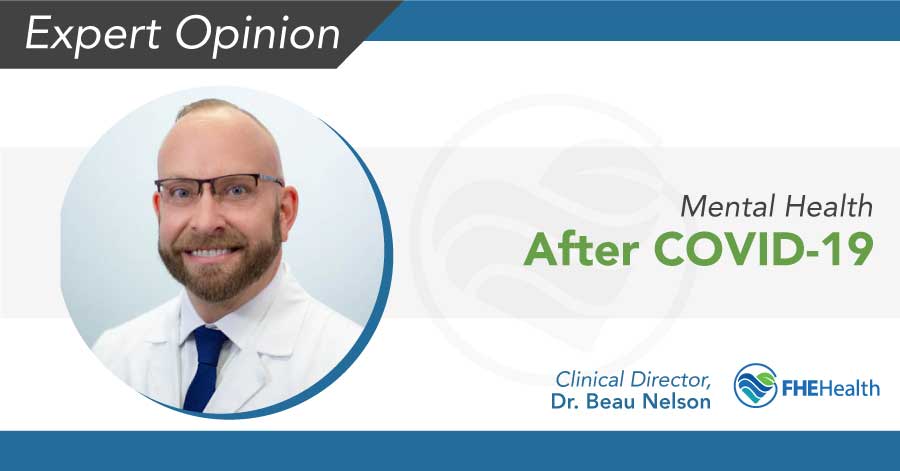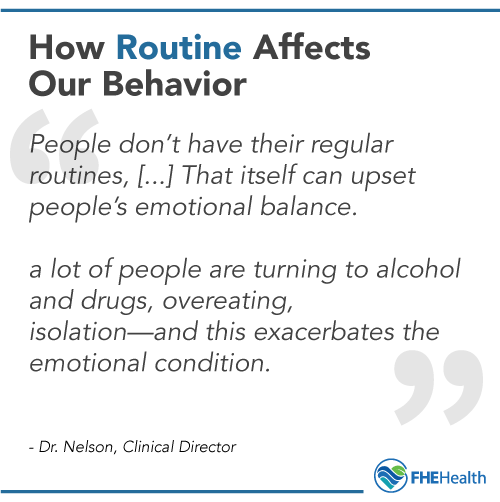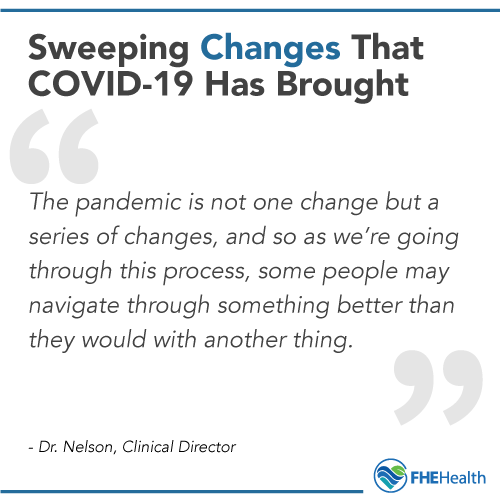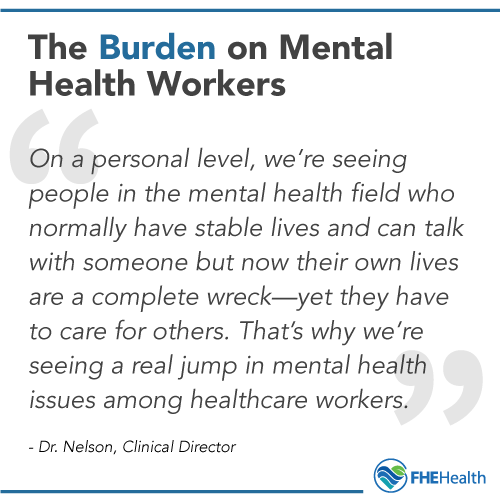
The number of lives lost to COVID-19 continues to rise, having now surpassed 100,000. Meanwhile, as an increasing number of states ease lockdown restrictions, the worst of the pandemic seems to be over. But is it? If the overall impact of a pandemic is measured not just in terms of lives lost to the disease itself, but also its long-term mental health impact on a population—we may have only begun to see the total fallout.
But, what are the long-term effects of a pandemic on mental health? For help with this question and others related to mental health after COVID-19, we turned to Dr. Beau Nelson. In his role as the director of clinical services at FHE Health, Dr. Nelson is intimately aware of the mental health repercussions of COVID-19 and the urgent need for more resources to address them. In a far-ranging interview, he addressed these issues and others, offering some sobering but cautiously optimistic projections regarding mental health after COVID-19.
The Mental Health Impact of COVID-19
The mental health impact of COVID-19 in the long run could be vast and overwhelming, according to Dr. Nelson. As evidence, he cited a May 29 Newsweek article that stated “the mental health toll from the Coronavirus could rival that of the disease itself,” thanks to an anticipated spike in “diseases of isolation” such as “suicides, opioid abuse, domestic violence, and depression.” The result could be a “mental health tsunami,” in the words of Director of National Institute of Mental Health Dr. Tom Insel, the article said.
Traumatic Stress vs. PTSD
 “Traumatic stress” is another concern due to higher stress and anxiety levels, Dr. Nelson said. He was quick to point out that traumatic stress is different from post-traumatic stress disorder (PTSD) but with time can morph into PTSD, depending on the individual:
“Traumatic stress” is another concern due to higher stress and anxiety levels, Dr. Nelson said. He was quick to point out that traumatic stress is different from post-traumatic stress disorder (PTSD) but with time can morph into PTSD, depending on the individual:
Traumatic stress is a normal but very intense reaction to a life event. For a lot of people, the pandemic and the corresponding changes create a state of traumatic stress. It looks like PTSD: You’ll have symptoms of sleep disruption, fatigue, personality changes, and persistent hypervigilance, but the thing with traumatic stress is that it lasts for a short time and gets better. With PTSD it gets worse with time.
How Loss of Routine, Stress Coping Outlets Raises Vulnerability to Stress
Dr. Nelson added that a person’s coping skills—and to what degree these are both healthy and effective—can be the arbiter between a short-term experience of traumatic stress and a manifestation of PTSD in the longer term. The challenge of COVID-19, moreover, is that it has disrupted people’s routines so that the very activities that once helped them cope (church, the gym, etc.) aren’t there.
“People don’t have their regular routines,” Dr. Nelson said. “That itself can upset people’s emotional balance.”
And, in the absence of those more healthy, regular routines—”a lot of people are turning to alcohol and drugs, overeating, isolation—and this exacerbates the emotional condition.”
The Long-Term Effects of the Pandemic on Mental Health
In addition to the above long-term effects of the pandemic on mental health, “what the pandemic has done in relation to mental health is it has shown that we don’t have adequate care for mental health concerns, including access to services, payment models, methods for how we triage folks … We’re now seeing that we didn’t really have a strong safety net,” Dr. Nelson said.
The question then becomes: “Are we willing to put resources to behavioral health services. What’s the response to this?”
In other words, a mental healthcare system that faces overwhelming needs will either crumble under their weight or be recognized as an essential and critically important sector of healthcare that’s worth supporting and investing in.
How Pandemics Affect Mental Health
 One interesting trend helps to shed light on how pandemics affect mental health—and, in particular, how people respond and are impacted differently, according to Dr. Nelson. On the one hand, the pandemic has been a near-universal introduction to anxiety, depression, loss, and trauma, causing many people to experience mental and emotional pain and suffering on a scale that they’ve never experienced before.
One interesting trend helps to shed light on how pandemics affect mental health—and, in particular, how people respond and are impacted differently, according to Dr. Nelson. On the one hand, the pandemic has been a near-universal introduction to anxiety, depression, loss, and trauma, causing many people to experience mental and emotional pain and suffering on a scale that they’ve never experienced before.
On the other hand, for many people with mental health histories—those you’d think would be most vulnerable to the stress of COVID-19—the pandemic has not been earth-shattering or caused an uptick in symptoms. For example, a woman with panic disorder who shared her story with The Daily Beast reported that her panic attacks had subsided since the start of quarantines. Meanwhile, she said that people are coming to her freaking out and asking her for advice.
Dr. Nelson pointed to stories like these as a way to illustrate how, “for those with underlying mental health issues, this time could go either way.” Here’s how he explained it:
The pandemic is not one change but a series of changes, and so as we’re going through this process, some people may navigate through something better than they would with another thing. This is very individualized. Depending on the level of disruption in someone’s life, you may see a corresponding change in their emotional and mental states. Not everyone reacts to the same event the same way. A lot of this has to do with what we do with the event—not the event itself. Some folks have rededicated to their exercise routine, meditation, religious disciplines, efforts to connect with others—generally, these people will do better [in a pandemic].
Mental Health in Pandemics vs. Other National Crises
 Are there mental health parallels to draw between the COVID-19 pandemic and other national disasters, crises, or wars? Dr. Nelson began with some key distinctions:
Are there mental health parallels to draw between the COVID-19 pandemic and other national disasters, crises, or wars? Dr. Nelson began with some key distinctions:
- The scale and size of this pandemic – In a pandemic like this one, “the difference is that everyone everywhere is going through the same thing. In a localized situation like a hurricane, we have lots of resources that go to the impacted place … A pandemic is so pervasive and resources ae scarce. Normally, you have first responders and volunteers who go into an area, but here everyone is in a crisis.”
- Time duration – “A hurricane lasts for a few days but this could last for two years. It’s just the enormity and scale and what that means for putting resources to the problem.”
- The specific nature of the mental health issues – In addition to expected spikes in depression, anxiety, and traumatic stress, neurological issues reportedly associated with COVID-19 are a unique feature of this pandemic, Dr. Nelson said.
- The pronounced intensity of the burden on mental health and healthcare professionals – “On a personal level, we’re seeing people in the mental health field who normally have stable lives and can talk with someone but now their own lives are a complete wreck—yet they have to care for others. That’s why we’re seeing a real jump in mental health issues among healthcare workers.”
On this last point, Dr. Nelson emphasized that “the concern for frontline workers is suicide. Suicide doesn’t just mean being depressed. It’s a real sense of hopelessness that things can’t get better.”
As with other large-scale events in the last century, this pandemic will change our collective consciousness, Dr. Nelson said. “We have to adapt, but adaptation often means we hold on to something, whether our fears, our sense of vulnerability and fragility, etc. … That component can have lasting effects.”
Dr. Nelson found an interesting parallel between the psychology of surviving in this pandemic and the psychology of the Cold War: “It’s more like, ‘Is that a spy or not a spy?’ Or, ‘I wonder if you have a gun. Do you have bullets?’ COVID-19 is an invisible enemy which is more about fear, and that changes how our psyche operates in these situations.”
The Enduring Power of Human Resilience
With all the gloom and doom, it would be easy to end there. But instead, Dr. Nelson lifted up human beings’ enduring capacity for adaptation and resilience: “Life goes on. Human beings have had to adapt for millennia. Nature, the universe, and we ourselves are programmed to survive. It may not be that we like it—and that’s a tough break—but can we go on? Most definitely.”
If you’re wondering how you can go on, let us help you find a path through the pain to healing, resilience, and recovery. Our caring counselors are here to listen and help.






